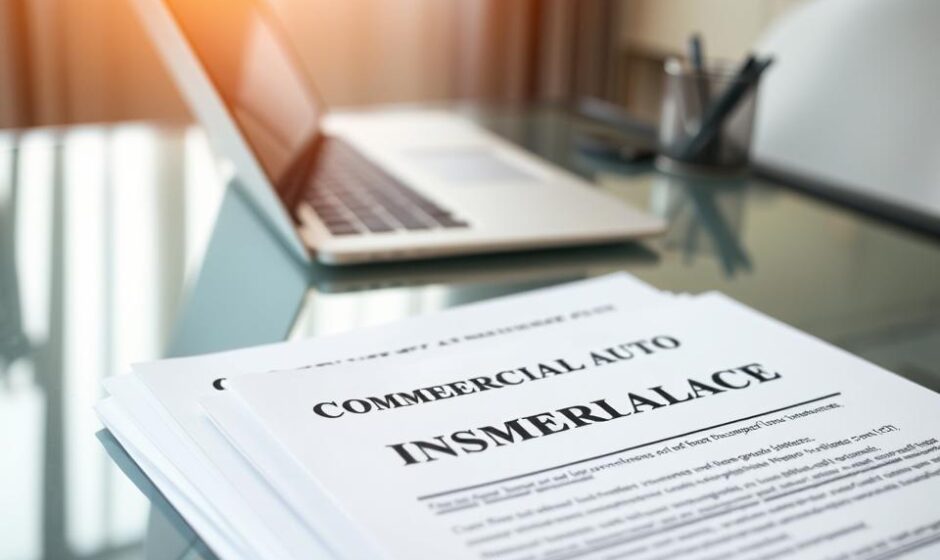Did you know over 1.9 million commercial vehicles in the U.S. are covered by Progressive Commercial’s policies? That’s enough to circle the globe more than three times. For businesses using cars, trucks, or vans, the right commercial auto insurance is essential. It protects against risks like fleet damage, liability claims, and interrupted operations.
Progressive offers 24/7 claims service and repair networks. This means vehicles can get back on the road quickly, reducing downtime. Policies can be customized to fit different industries, from food trucks to construction fleets. Without proper insurance, a single accident could cost thousands in repairs, legal fees, or lost revenue.
This article will show how tailored policies protect operations, make compliance easier, and help businesses grow.
Key Takeaways
- Progressive Commercial insures over 1.9 million vehicles nationwide.
- Customizable policies cover cars, trucks, vans, and specialized vehicles.
- 24/7 claims service and repair networks minimize downtime.
- Higher coverage limits protect against business-specific risks like fleet damage.
- Free fleet tools and safety programs reduce costs for eligible businesses.
Understanding Commercial Auto Insurance
Business vehicles need more than a personal policy. Commercial auto insurance is made for work use. It covers risks not found in personal policies. For example, it protects delivery trucks from damage or liability in accidents.
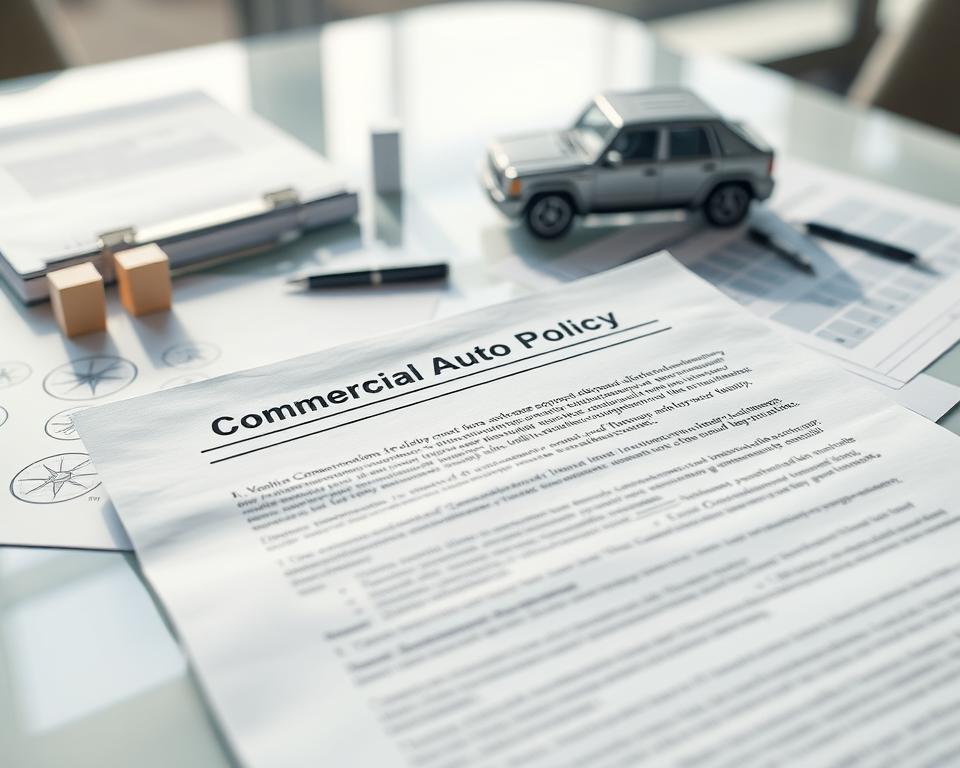
What Makes Commercial Auto Insurance Different
Commercial auto insurance has higher limits and more protection. It offers more than personal policies, like trailer coverage or gap insurance. For example, contractors with heavy machinery in trucks need special endorsements.
Legal Requirements for Business Vehicles
Every state has rules for business vehicles. Not following these can lead to fines, license loss, or lawsuits. Businesses with food trucks or delivery vans must check their state’s rules. For example, California requires at least $15,000 in bodily injury coverage per person.
Who Needs Commercial Auto Coverage
- Delivery companies transporting goods
- Contractors operating work vans or service trucks
- Food service businesses with mobile units
- Nonprofits using vehicles for programs
Even small businesses with one car need this insurance. A landscaping business owner, for example, needs coverage for theft or damage.
Key Benefits of Protecting Your Business Fleet
Getting the right fleet insurance or business vehicle insurance changes how your company deals with surprises. Good coverage keeps your business moving, no matter if it’s delivery trucks, company cars, or service vans.
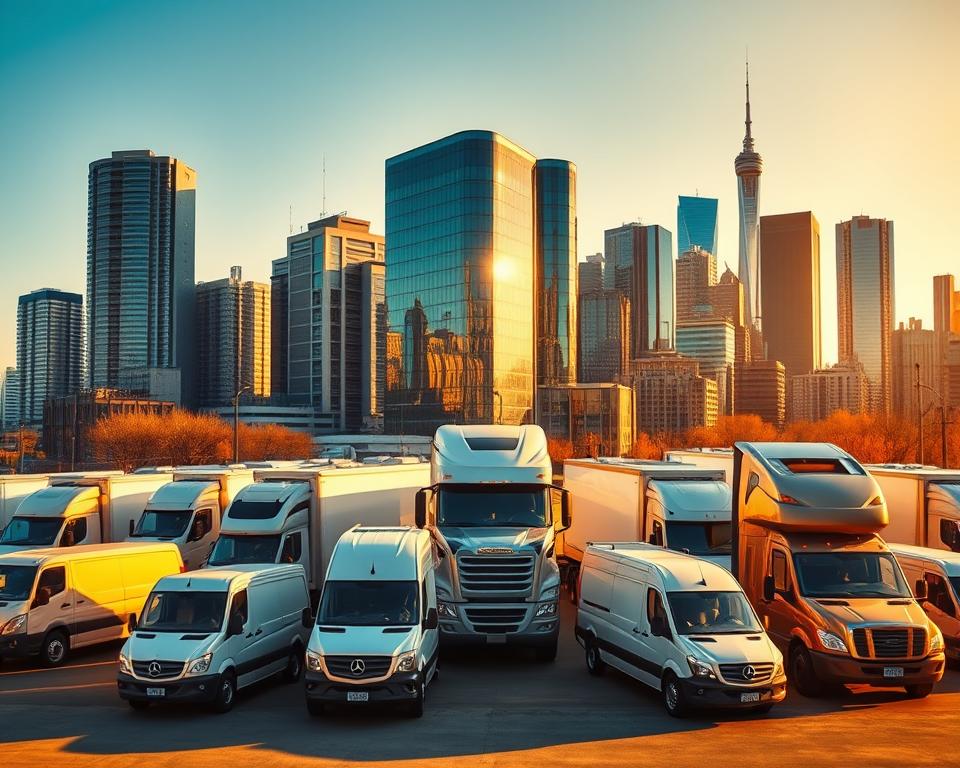
- Cost control: Policies like collision and comp coverage cut down on repair and replacement costs after accidents, theft, or natural disasters.
- Risk management: Liability coverage protects your business from lawsuits by covering injuries to others and property damage.
- Employee support: Medical payments coverage helps pay for medical bills for injured workers, making recovery easier financially.
- Operational continuity: Downtime coverage gives you replacement vehicles and lost income reimbursement during repairs or claims.
Companies like Progressive offer flexible options for your business. They have bulk discounts for many vehicles and 24/7 claims support for easy management. Their programs include roadside assistance and risk assessments to prevent accidents.
With adjustable coverages and payment plans, businesses can pick policies that fit their daily needs and growth goals. Choosing fleet insurance isn’t just about following rules—it’s about being strong. By picking a partner with these benefits, you protect your profits and keep drivers and assets safe.
Types of Commercial Auto Insurance Coverage
Understanding the different commercial auto coverage options is key to protecting your business fleet. Commercial vehicle insurance offers tailored solutions for various risks. This section explains the main coverage types every business should consider.
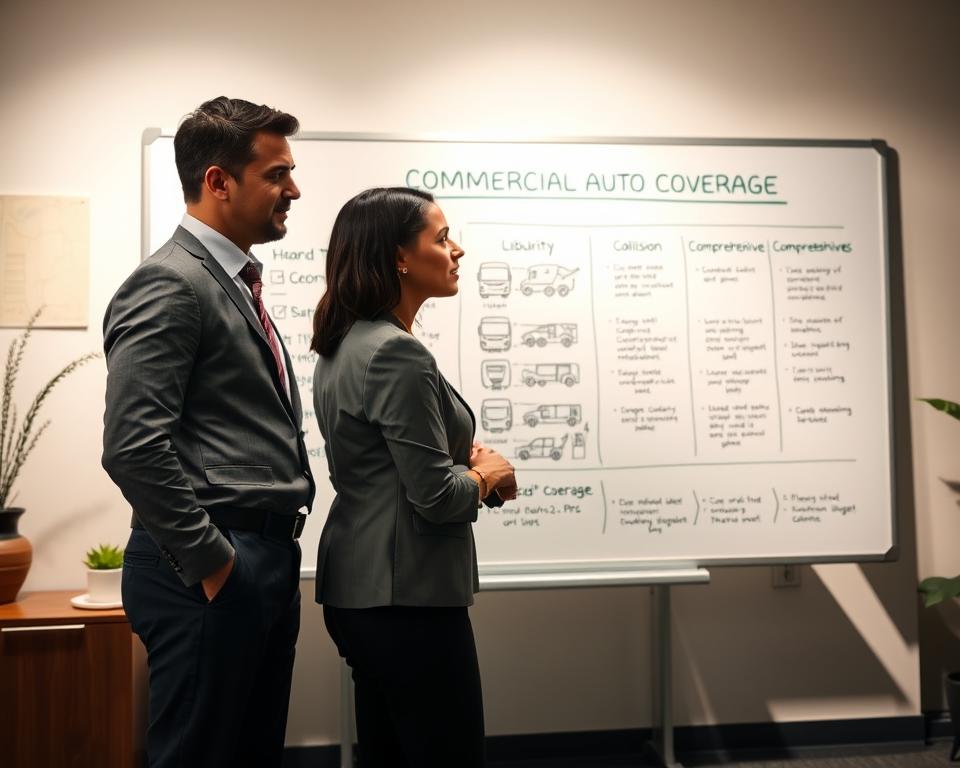
Liability Coverage Options
Liability coverage helps protect businesses from financial risks. It includes:
- Bodily injury and property damage liability for accidents causing injuries or third-party property damage
- Combined single limit (CSL) which combines these into a single payout cap
- Hired and non-owned auto (HNOA) coverage for vehicles not owned by the business
Physical Damage Protection
Physical damage options protect vehicles from direct harm:
- Collision coverage repairs or replaces vehicles after crashes
- Comprehensive coverage handles theft, vandalism, or weather-related damage
- Deductibles vary based on the insurer and chosen policy limits
Specialized Coverage Add-ons
Customize policies with add-ons like:
- Uninsured motorist coverage for accidents involving at-fault uninsured drivers
- Cargo insurance for businesses transporting goods
- Rental reimbursement during repairs after an accident
Non-Owned Vehicle Coverage
This coverage protects businesses when employees use personal vehicles for work. It covers liability claims but not physical damage to the employee’s car. It fills gaps in standard commercial auto coverage for off-the-clock business use.
Choosing the right mix of these options ensures your business stays protected without overpaying. Consult insurers to align coverage with your fleet’s unique risks.
How Commercial Auto Insurance Safeguards Your Business Assets
Understanding commercial auto insurance is key to protecting your business. It guards vehicles, finances, and your reputation. For example, if a company car gets into an accident, company car insurance pays for repairs, medical bills, and legal fees. Without it, your business could lose a lot of money.
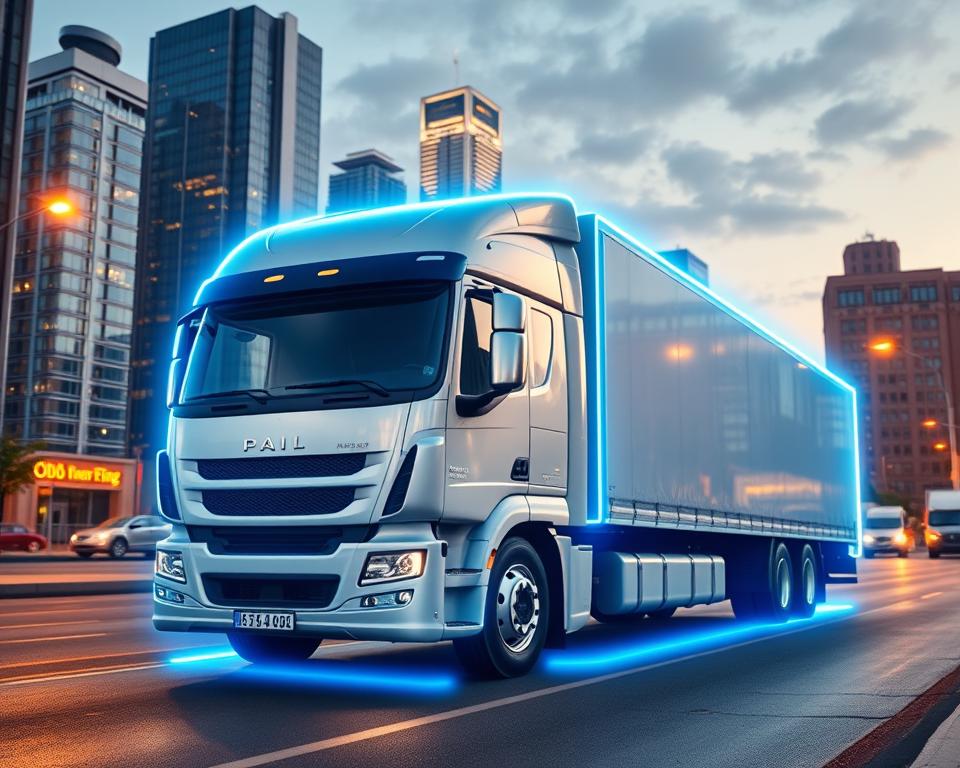
Vehicles like trucks, vans, or delivery fleets are covered. Policies handle damages from accidents, theft, or natural disasters. Financially, it prevents huge losses: the average accident claim is $45,000, and severe cases can be over $1 million. Commercial auto insurance takes care of these costs, keeping your finances stable.
Your brand’s reputation also relies on this protection. Think about a food delivery truck damaging someone’s property. A fast insurance response shows you care about safety, keeping customer trust. Many contracts require proof of coverage to keep partnerships strong.
“Effective coverage isn’t just about repairs; it’s about staying operational post-incident.”
Choose policies that fit your fleet size and industry. For example, construction firms need more coverage than office supply deliveries. Compare quotes to find a plan that covers all your business vehicles, including rented or leased ones. Small businesses can benefit from bundling coverage to make management easier.
By picking the right commercial auto insurance, businesses protect their assets without slowing down growth. It’s not just about managing risks—it’s about strategic protection for long-term success.
Factors That Affect Your Commercial Auto Insurance Premiums
Choosing the right commercial auto insurance starts with knowing what drives your costs. These factors help businesses understand and manage their rates effectively.

- Vehicle Type and Use: Trucks and trailers cost more to insure due to repair expenses. Commercial truck insurance rates depend on vehicle age and safety features. Newer trucks may cost 10% more to insure than older models, per 2024 data.
- Driver History: Clean records lower premiums. Distracted driving concerns affect 64% of businesses. Training programs can reduce accident risks and lower costs.
- Location: Urban areas mean higher premiums due to traffic and crime. Insurers use ISO ratings based on local accident data and claim history. Rural areas may offer lower rates.
- Claims and Credit: Past claims and credit scores impact rates. Insurers review credit reports (except in CA, MA, HI). Better scores may lower premiums.
- Rising Costs: Bodily injury claims rose 20% and litigation costs spiked. Repair costs increased 10% in 2023–2024.
Businesses can lower costs by choosing older vehicles, improving driver training, and bundling policies. Reviewing credit scores and adjusting coverage levels also helps manage premiums effectively.
Best Commercial Auto Insurance Policies by Vehicle Type
Choosing the right insurance starts with knowing your vehicle type. Commercial truck insurance, commercial van insurance, and company car insurance each have special needs. Let’s explore what’s important for your business.
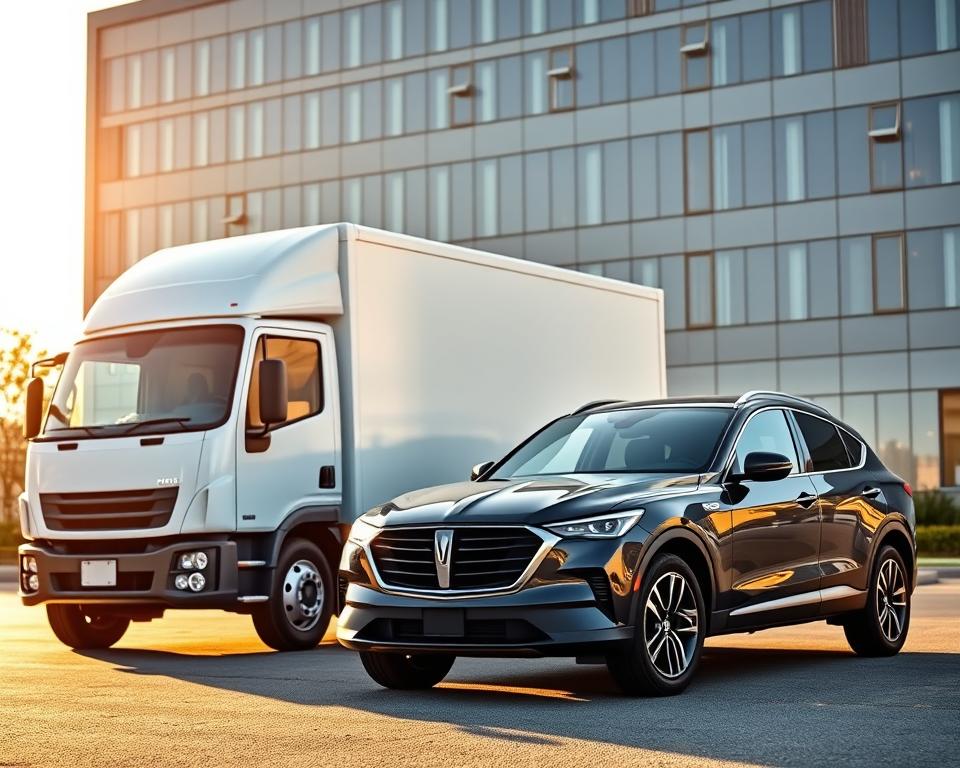
Commercial Truck Insurance Considerations
Big trucks need more liability and cargo protection. Look for insurers that offer:
- Property damage liability up to $1 million
- Cargo insurance for goods being transported
- Uninsured motorist coverage for highway risks
Progressive offers commercial truck insurance for dump trucks and tractor-trailers. Rates range from $2,000 to $8,000 yearly, based on fleet size.
Commercial Van Insurance Options
Delivery vans need coverage for what’s inside and the routes they take. Key points include:
- Combined single limit policies starting at $100,000
- Collision for vehicle damage
- Medical payments coverage for passengers
Commercial van insurance starts around $1,200 annually. Fleets with 10+ vans might get discounts.
Company Car Coverage Essentials
Executive or sales vehicles need policies that balance business and personal use. Focus on:
- Comprehensive coverage for theft/theft
- Personal use endorsements
- Usage-based pricing for low-mileage drivers
Company car insurance costs average $800–$3,000 yearly. Progressive offers custom programs for sales fleets.
| Vehicle Type | Key Coverage | Cost Range | Top Insurers |
|---|---|---|---|
| Trucks | High liability, cargo insurance | $2,000–$8,000 | Progressive, others |
| Vans | Delivery liability, contents coverage | $1,200–$4,500 | Progressive, Allstate |
| Company Cars | Personal use allowances, collision | $800–$3,000 | Progressive, Nationwide |
Finding the Right Fleet Insurance for Multiple Vehicles
Fleet insurance makes covering many business vehicles easier and safer. It’s perfect for companies with at least two vehicles. This commercial vehicle insurance is customized to fit your business’s specific needs.

First, figure out how many vehicles you have and what kind of business you run. Construction fleets might need more liability coverage than delivery services. Also, check your state’s laws to make sure you’re covered.
Look for insurers like Progressive. They offer fleet insurance with tools like telematics. This helps track driver habits and lower risks.
- Customize coverage tiers: Choose the right policy for each vehicle’s value and use. Older trucks might just need basic physical damage, while newer vans need full collision protection.
- Compare deductible options: Higher deductibles mean lower premiums but you need to be ready for unexpected repair costs.
- Explore add-ons: Consider adding uninsured motorist coverage or emergency roadside assistance for extra protection.
As your fleet grows, check your insurance every year. Agents can help find the right balance between cost and coverage. This ensures your business stays safe and compliant.
Industry-Specific Commercial Vehicle Insurance Solutions
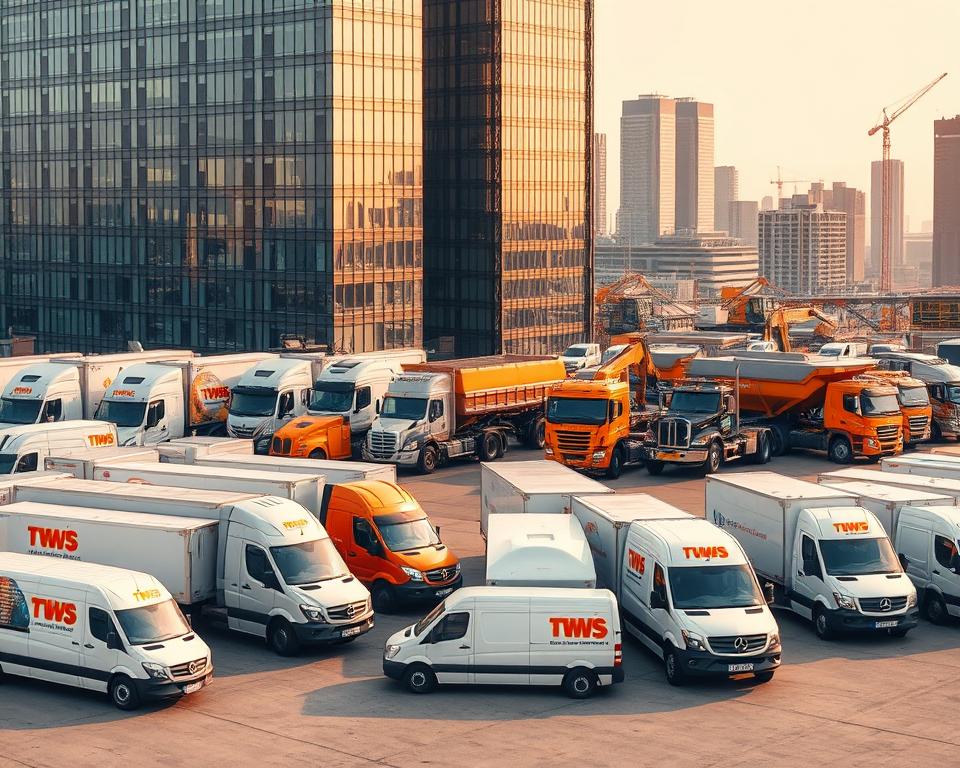
Every business faces unique risks on the road. That’s why you need commercial vehicle insurance that fits your industry’s needs. Whether you’re moving equipment or delivering meals, the right coverage keeps things running smoothly.
Let’s look at how four industries use business vehicle insurance to their advantage:
Construction and Contracting Businesses
Construction sites are full of heavy machinery and hazards. You’ll need a policy that covers:
- Damage to bulldozers or cranes during transport
- Tools and materials theft protection
- Liability for worker injuries or property damage
Average annual cost: $173*
Delivery and Transportation Services
Protect your fleet with policies that handle high-mileage claims:
- Cargo insurance for lost or damaged goods
- Collision coverage for delivery vans/trucks
- Mileage-based premium adjustments
Average annual cost: $163*
Food Service and Catering Companies
Keep your food trucks safe with:
- Temperature-control equipment coverage
- Food contamination liability
- Delivery vehicle breakdown protection
Average annual cost: $152*
Professional Service Providers
Real estate agents, consultants, and tradespeople need policies that balance:
- Personal vs. business use clauses
- Hired and Non-Owned Auto (HNOA) for client-owned vehicles
- Low-mileage discounts
Average annual cost: $163*
| Industry | Risk Focus | Average Cost |
|---|---|---|
| Construction | Heavy equipment | $173 |
| Delivery | Cargo + mileage | $163 |
| Food Service | Temperature control | $152 |
| Professional Services | Personal/commercial mix | $163 |
24/7 claims reporting via 1-888-NEW-CLMS ensures fast incident responses for all industries.
Getting the right coverage for your business protects profits and keeps operations running. Compare quotes from insurers that offer commercial vehicle insurance tailored to your industry.
The Commercial Auto Claims Process: What to Expect
Accidents can happen anytime. Knowing how to handle claims under your commercial auto insurance is essential. This guide will help you navigate the process smoothly:
- Contact authorities first: Call 911 for emergencies. File a police report for any incident—it helps speed up claims.
- Secure details at the scene: Get names, insurance info, and take photos of damage. Also, note witness contacts and the weather.
- Notify your insurer promptly: Call your provider, like Progressive, for 24/7 support. Give your policy number and incident details.

Adjusters will check who’s at fault and the damage. If approved, repairs can be done at approved shops. Some commercial auto coverage policies offer temporary rentals during repairs. Keep all receipts for reimbursement.
“A well-documented claim reduces stress. Stay calm and follow your insurer’s steps,” advises industry experts.
Claims can take 1–4 weeks, depending on the situation. If denied, appeal in writing with evidence. Remember, a claim might affect renewal premiums, so accurate reporting is key. Use apps like “InsurTech Claims Manager” to track your claim.
- Always review repair estimates before signing off.
- Keep your agent updated on any changes in the situation.
- Store all claim correspondence in a dedicated folder for easy reference.
Commercial auto insurance is there to protect your business, not add stress. By staying organized, you ensure a smooth recovery and minimal downtime.
Strategies to Lower Your Business Vehicle Insurance Costs
Businesses looking to save money without losing protection have several options. Making small changes in how you operate and what you choose for coverage can lead to big savings. This is true for both business vehicle insurance and fleet insurance policies.
Begin by implementing a safety program to lower risks and premiums. Training drivers, conducting safety checks, and setting clear rules for safe driving can greatly reduce accidents. Companies with a clean safety record might get discounts, like Progressive’s Snapshot ProView, which offers 5–20% off for fleets with good safety records.
- Driver training programs reduce collision risks and claims.
- Anti-theft devices and secure parking cut theft-related claims.
- Clear safety policies attract insurer discounts.
Fleet management technologies help lower premiums. Telematics tools track driving habits, and GPS systems monitor vehicle locations. Businesses with three or more vehicles can use free tools to spot risky behaviors. Progressive’s Snapshot ProView offers free tools and up to 20% savings for fleets that improve their safety.
Policy bundling can save money by combining fleet insurance with other policies. Adding auto coverage to general liability or workers’ compensation can lead to discounts. Paying premiums upfront or via EFT can save 15% or more. Also, raising deductibles responsibly can lower monthly costs while keeping you ready for claims.
Regularly checking your policies with insurers helps ensure you have the right coverage and cost-saving options. Every change, from driver training to bundling policies, helps create a safer and more affordable business vehicle insurance plan.
Conclusion: Securing the Right Commercial Auto Insurance for Your Business Needs
Protecting your business starts with the right commercial auto insurance. Progressive, the nation’s largest provider, insures over 1.9 million commercial vehicles. This shows the importance of tailored coverage for your business.
State laws, like Chicago’s, require this coverage to ensure compliance. Without it, businesses risk penalties, lawsuits, or even closure after an incident. Specialized coverage like medical payments or cargo protection ensures you’re fully prepared for industry-specific challenges.
Start by assessing risks and comparing quotes to find the best fit. Prioritize insurers with expertise in your field, like construction or delivery services. A quick quote unlocks policies that balance affordability and protection. Choosing the right commercial vehicle insurance today safeguards your business’s future, ensuring you’re ready for any road ahead.

